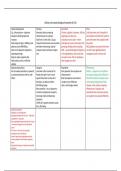Outline and evaluate biological treatments (6+10).
Typical Antipsychotics Thornley Side effects Ethics
E.g. chlorpromazine – dopamine Reviewed studies comparing Dizziness, agitation, sleepiness, stiff jaw, Could have been used in hospitals to
antagonist, blocking dopamine chlorpromazine to a placebo weight gain and itchy skin calm patients and make them easier to
receptors Data from 13 trials with 1121 pps Involuntary motor action – where work with rather than actually benefit
Daily dosage as high as 1000mg, most showed chlorpromazine was associated prolonged use causes facial spasms like the patient
patients around 400-800mg with better functioning, reduced grimacing, blinking and lip-smacking NICE guidelines reccomend short-term
Work on the dopamine hypothesis – symptom severity and lower relapse NMS – caused by blockage of dopamine use with overly agitated patients,
hyperdopaminergia rate in the hypothalamus and can be fatal – campaigners want to remove this
Helps tor educe symptoms like can lead to coma. This has declined as
hallucinations and is an effective lower dosages are taken
sedative
Atypical antipsychotics Clozapine Risperidone Effectiveness
Aim to develop medication as powerful Used when other treatments fail More powerful than clozapine and Meltzer – clozapine is more effective
as chlorpromazine but with less side- People who take it have to have chlorpromazine than typical antipsychotics Effective in
effects regulatr blood tests so they don’t Binds to dopamine and serotonin 30%-50% of treatment resistant cases
develop a rare blood condition receptors more effectively where typical antipsychotics failed
300-450mg dosage Only a small dosage needed However, other studies comparing
More powerful – acts on dopamine, effectiveness of clozapine and
serotonin and glutamate receptors , risperidone have inconclusive results –
improving mood and depressive every patient may respond differently
symptoms
30-50% of Sz patients attempt suicide,
this is life-saving
Dopamine hypothesis
Originally, it was thought that
hyperdopaminergia was the issue – high levels
of dopamine in subcortex
Now, hypodopaminergia could also be an issue
– low levels of dopamine in the prefrontal
cortex
If the issue is low, then anti-psychotic
medications won’t be effective
Doesn’t explain why amphetamines which
increase dopamine levels makes symptoms
worse
Antipsychotic drugs most widely used medical
treatment
, All information collated from the following sources:
Flanagan, C., Berry, D., Jarvis, M., & Liddle, R. (2015). AQA Psychology for a Level. Year 1 & AS. Illuminate Publishing.




